
New Debt Collection Legislation

In May of this year, Governor Ron DeSantis signed into law Senate Bill 232, which made some changes to the Florida Consumer Collections Practices Act (FCCPA). These changes cut off claims for relief for consumers and consumer protection law firms with respect to email communications. Due to the rising number of lawsuits that allege debt collectors have violated the “quiet hours,” outlined in the statute, specifically via emails sent after 9:00 p.m. or before 8:00 a.m. in the consumer’s local time zone, the amendment to the FCCPA clarifies that prohibited contact between the hours of 9:00 p.m. and 8:00 a.m. in debt collection does not include email communication. The revised section of the FCCPA (Fla. Stat. § 559.72(17)) now states that a creditor is prohibited to “communicate with the debtor between the hours of 9:00 p.m. and 8:00 a.m. in the debtor’s time zone without the prior consent of the debtor. This subsection does not apply to an email communication that is sent to an email address and that otherwise complies with this section” (emphasis added).
 In commentary surrounding the bill, the Florida Legislature “acknowledges that Florida Statute § 559.72 was adopted before email communication became commonly used, and that the only specific communication explicitly contemplated in such subsection is telephone calls.” Senate Bill 232 sought to “update and clarify prohibited practices in collecting debt to address email communication by excluding such communication from prohibited contact between the hours of 9:00 p.m. and 8:00 a.m. because such contact is less invasive and less disruptive than telephone calls.”
In commentary surrounding the bill, the Florida Legislature “acknowledges that Florida Statute § 559.72 was adopted before email communication became commonly used, and that the only specific communication explicitly contemplated in such subsection is telephone calls.” Senate Bill 232 sought to “update and clarify prohibited practices in collecting debt to address email communication by excluding such communication from prohibited contact between the hours of 9:00 p.m. and 8:00 a.m. because such contact is less invasive and less disruptive than telephone calls.”
The revised FCCPA is a welcome clarification for creditors defending against FCCPA lawsuits throughout the state of Florida in which it had been alleged that a violation based upon an email was made. However, it should be noted that law stated that it went into effect immediately but failed to address whether it was retroactive. So, the retroactive application of this amendment remains to be seen.
It should be noted, unlike the FDCPA, which excludes original creditors, the FCCPA provides broader protections by covering original creditors as well. The FCCPA provides for both regulatory enforcement and private causes of action by consumers harmed by violations. Penalties include actual damages, statutory damages up to $1,000 per action, punitive damages, injunctions, court costs, and attorney’s fees. Therefore, it is essential that the Credit Union stay abreast of the ever-changing landscape to ensure compliance and avoid costly litigation. I would encourage that every Credit Union review the Florida Consumer Collections Practices Act at least once a year. If you have questions, or if we can be of help, please reach out to a lawyer at our firm.
Florida Supreme Court Weighs in on Garnishment of Spousal Deposit Accounts

In a recent decision from the Florida Supreme Court, the high court addressed the protections of spousal accounts from garnishment. A garnishment, whether it be a continuing wage garnishment or a bank garnishment, is a common tool used by creditors for collecting on a judgment.
In Florida, certain protections can be afforded to real and personal property owned by a married couple. Property can be titled in one of three ways: tenants in common, joint tenants with rights of survivorship, or tenants by the entirety. Tenants by entirety only applies to a married couple. To qualify, it must meet the six unities, which are possession, interest, title, time, survivorship, and marriage.
In Beal Bank, SSB v. Almand & Associates, 780 So. 2d 45 (Fla. 2001), a seminal Florida Supreme Court decision, the high court held that a deposit account that meets the six unities and is held as tenants by the entirety can be protected from garnishment by a judgment creditor. The question arises about an account that does not meet the unity of time and title. It may not be uncommon for an individual to open a deposit account, later marry, and then add their new spouse to the account. In this scenario, a judgment creditor may argue that the unity of time and title are not met; thus, the account is subject to garnishment. This issue was very recently addressed and clarified by the Florida Supreme Court in Loumpos v. Bank One, Case No. SC2024-1256 (Fla. 2025).
In Loumpos, a judgment creditor obtained a judgment against an individual. Subsequent to the entry of the judgment, she married and was added to her husband’s already existing deposit account. As part of the process, they signed new signature cards that stated they owned the account as husband and wife. The judgment creditor then sought to garnish the account and argued that the debtor’s name was not on the account originally, so the unity of time and title were not met. In its analysis of the issue, the Supreme Court looked at both Beal Bank and Section 655.79 (1), Florida Statutes. This statute was amended in 2008, subsequent to the Court’s ruling in Beal Bank. Under Section 655.79 (1), Florida Statutes, for an account owned by two or more persons, there is a presumption that upon the death of any one person, all rights, title, interest, and claim in, to, and in respect of such deposit account, less all proper setoffs and charges in favor of the institution, vest in the surviving person or persons. In 2008, the following sentence was added: “Any deposit or account made in the name of two persons who are husband and wife shall be considered a tenancy by the entirety unless otherwise specified in writing.” The Court, when reading this sentence, found that a deposit account originally owned by an individual and then converted to a spousal account, can be held as tenants by the entirety, regardless of the unity of time and title.
It’s important to understand these spousal protections when contemplating a garnishment or other means of enforcing a judgment, as well as the protections afforded to your members. If you have questions about the ability to garnish a deposit account or protections for spousal accounts, please do not hesitate to contact one of the lawyers at SVL for legal advice.
Staff Spotlight on Gisselle Perez

Gisselle joined our team as an Associate Attorney on October 27, 2025. She is originally from Long Island, New York, but was raised in Central Florida. Gisselle earned her Bachelor of Science degree in Political Science and Economics from Florida State University in 2019. She then earned her Juris Doctor degree, cum laude, from Barry University School of Law in 2022.
Gisselle’s parents were born and raised in El Salvador before having to flee the Salvadoran civil war in the 1980s. Their origin story of coming to America is one of Gisselle’s biggest reasons of why she became a lawyer. In light of her family’s sacrifices, it is a privilege to pursue education, and she does not take her schooling and her degrees for granted. She always puts her best effort into anything she is working on and continuously looks for ways to grow both personally and professionally – we love this about her!
Gisselle is married to her husband Amado, who she says is her biggest supporter. Amado is an emergency department nurse and is currently studying at Seminole State College to complete his nursing (BSN) degree. Gisselle and Amado met when they were eighteen years old and will be celebrating their one-year wedding anniversary at the end of December!
In her spare time, away from work, she loves spending time with her husband and their Australian cattle dog, Moose. Gisselle loves a hot cup of chai and a cozy romance or fantasy book too! She also loves being active outdoors. You can often find her roller skating or doing pilates.
Gisselle, we are excited for you to be apart of our team. Welcome!
Staff Spotlight on Amelia Ziadie Hajer

Amelia joined our team as an Associate Attorney on October 27, 2025. She was born and raised in Kingston, Jamaica, and has also lived in Canada and the Cayman Islands. Amelia completed her first degree in Economics and Business at Agnes Scott College in Decatur, Georgia. She says this degree was especially useful in her legal practice, particularly in understanding financial matters, analyzing transactions, and approaching cases with a practical, business-minded perspective. Amelia also holds a law degree from the University of Liverpool and a Caribbean Legal Education Certificate. She practiced law in Jamaica for several years before moving back to Georgia after getting married. During this time, she returned to school and completed an LLM at Georgia State University and sitting for the Georgia Bar. She is valuable to Sorenson Van Leuven, as she is licensed in Georgia along with Jim and Tyler.
Amelia is married to her husband, Arcan. They have been married almost 10 years. They have two sons, ages 8 and 6. In her spare time, Amelia enjoys spending time with her dog, Pepper, a long hair chihuahua. She also enjoys going to the gym. Additionally, she loves to spend time in the kitchen cooking, exploring new foods and trying out recipes. Her and her husband get their culinary inspiration from cooking shows, travel videos on YouTube, as well as make each other’s family recipes that comprise of mostly Jamaican, Chinese, Lebanese, Kurdish, and other Middle Eastern dishes.
Amelia likes working with Credit Unions because they are so member-focused. She feels it is rewarding to support institutions that serve their communities. Amelia says with experience living and studying in Jamaica, the United States, Canada, and the Cayman Islands, she brings a multicultural perspective to her work and values clear, practical communication with our Credit Union clients and their members.
We are so happy to have you on our team, Amelia!
Halloween at the Office
 The staff of Sorenson Van Leuven enjoyed Halloween at the office on Friday, October 31, 2025. We had our annual costume contest, which included our Tallahassee and Mexico team. Congrats to our Winners: First Place: Sarah, as a pinata. Second Place: Ale, as a pirate. And Third Place: Noel, as an inflatable cow. We love making SVL a fun working environment.
The staff of Sorenson Van Leuven enjoyed Halloween at the office on Friday, October 31, 2025. We had our annual costume contest, which included our Tallahassee and Mexico team. Congrats to our Winners: First Place: Sarah, as a pinata. Second Place: Ale, as a pirate. And Third Place: Noel, as an inflatable cow. We love making SVL a fun working environment.



A Retrospective Look at the
2025 Amendments to the Florida
Rules of Civil Procedure

On January 1, 2025, the Florida Rules of Civil Procedure changed. The Supreme Court adopted these new rules with the hope that they would bring efficiency and help to keep cases moving through the court system in a timely manner. Now that we are more than nine months into these changes, I want to explore and explain how they impact the pursuit of collection matters through litigation in Florida.
Most of the litigation cases we handle for our clients are routine collections litigation. For example, a lawsuit on a defaulted loan, seeking the award of a final judgment in favor of the creditor. These suits are often straightforward, and the majority result in a default judgment because the defendant (debtor) fails to timely respond to service of the summons and complaint. When a defendant does answer, the answer is often filed without an attorney and is framed more as an explanation of why they did not or cannot pay the debt, rather than raising any legal defenses to the debt.
Given the uncomplicated nature of this litigation, we hoped that these changes to the Rules of Civil Procedure would not slow the process or require additional work to obtain a judgment in a routine collections case.
The Changes
One of the most significant changes was the creation of Rule 1.200, which controls case management and pretrial procedure. Before this new rule was enacted, Judges had the discretion to assign cases to case management tracks. However, in most collections litigation cases, they were not assigned to a case management track, so we could avoid some of the additional work and processes that often come with such assignments.
 The new system requires that each judicial circuit define three case management tracks: complex, general, and streamlined. The rule empowered the Chief Judge in each judicial circuit to issue administrative orders defining the deadlines for each track. Most collections court cases will fall under the streamlined track. Under the new rule, the streamlined track must address time periods and deadlines for the following: service of the complaints; adding a new party; completing discovery; filing a motion for summary judgment; and completing mediation.
The new system requires that each judicial circuit define three case management tracks: complex, general, and streamlined. The rule empowered the Chief Judge in each judicial circuit to issue administrative orders defining the deadlines for each track. Most collections court cases will fall under the streamlined track. Under the new rule, the streamlined track must address time periods and deadlines for the following: service of the complaints; adding a new party; completing discovery; filing a motion for summary judgment; and completing mediation.
An additional change, set out in Rule 1.200, is the requirement for courts to enforce court and rule deadlines strictly. As a result, courts are now enforcing strict deadlines for service of process. While there was a previous rule requiring service of process to be completed within 120 days of the date the case was filed, Judges failed to enforce this deadline, and it was rare for a case to be dismissed for failure to complete service of process within that time. Now, courts are strictly enforcing this deadline and generally will only give one extension for service of process.
In addition, the new rules change the discovery process. In litigation, the discovery process is used to determine the facts of a case and what evidence the other side may have related to the allegations. Discovery includes depositions, requests for production, requests for admissions, and interrogatories. Under the new rules, parties must make initial discovery disclosures to the other party within 60 days after service of the complaint or joinder of a party to the action.
Under the new rules, the parties must disclose the names of persons with knowledge that they may use to support their claims or defenses, and they must reveal the knowledge each person has related to the claim or defense. Additionallly, a party must disclose copies of or descriptions of documents that the disclosing party may use to support its claims or defenses. Finally, it must reveal how it calculates damages in the case.
The Outcome
In short, the result of these changes has increased the workload for each case we handle. The time required to handle each case has increased by a minimum of 2 to 3 hours per case. However, to date, we have seen no real gain in judicial efficiency. Unfortunately, Judges in Florida are assigned heavy caseloads without sufficient support staff. The rules create additional administrative burdens on the court and the lawyers.
As mentioned above, each case is now put in a case management track with strict deadlines. The biggest hurdle in pursuing collections litigation is serving the defendant. Now that courts are strictly enforcing the 120-day deadline, we often must file a Motion to Extend the Deadline for service of process. If the defendant is not served by the time the second extension expires, the case is typically dismissed. If the client wishes to pursue the matter further, a new case must be filed, incurring an additional court filing fee.
Assuming we get the defendant served, we now have to make the initial discovery disclosures. Furthermore, if the defendant files an answer, unless we can resolve the case on a summary basis (via summary judgment or a stipulation), the court will require us to go to mediation, which takes additional time and incurs additional court costs (mediation fees).
Finally, in addition to keeping up with the assigned case management track, we must now track several court deadlines that will be strictly enforced. These deadlines not only include service of process and mediation, as addressed above, but also time to complete any necessary discovery, deadline to file dispositive motions, and to posture the case for trial, should a trial be necessary.
In conclusion, while the intentions behind these rule changes were good, the result has not improved case efficiency. Instead, they have led to additional work for lawyers and increased costs for litigating parties. Should you have questions about these rule changes and their impact on litigation, please do not hesitate to contact a lawyer at the firm.
Eleventh Circuit Reinforces
Strict Deadline for Dischargeability Complaints

In bankruptcy court, deadlines are not suggestions – they’re hard stops. Few areas of law are as procedure and time sensitive as bankruptcy, where missing a filing deadline by even a single day can mean the loss of significant rights. The Bankruptcy Rules are designed to promote finality and efficiency in the debtor’s “fresh start,” often leaving little room for equitable arguments when a creditor’s timing slips, no matter the reason. For Credit Unions, this means vigilance is everything. The moment a member files for bankruptcy protection, whether you receive official notice or just a letter from the debtor, your response clock starts ticking. The recent Eleventh Circuit decision in TL90108 LLC. V. Ford, 21-10456 (11th Cir. Aug. 11 2025) is a classic reminder of how unforgiving these timelines are.
Case Background
In TL90108 LLC v. Ford, decided in August 2025, the Eleventh Circuit confronted a sympathetic creditor who discovered—after the deadline had passed—that the debtor had fraudulently obtained a debt and then failed to list the creditor in his bankruptcy petition. When TL90108 LLC (“TL”) tried to file a complaint objecting to the discharge of the debt based on fraud, the bankruptcy court denied the request as untimely.
The case arose from a dispute over a rare stolen vehicle. TL purchased the vehicle overseas, but when they tried to register the vehicle in the United States, Wisconsin authorities identified Joseph Ford as one of the owners of record. Ford and another party sued TL in Wisconsin state court seeking to recover the vehicle. In January 2019, while that litigation was pending, Ford filed for Chapter 11 bankruptcy but failed to list TL as a creditor in his bankruptcy schedules. TL learned of the bankruptcy only when Ford filed a notice with the Wisconsin Supreme Court about a month after the bankruptcy filing. The 60-day deadline under Federal Rule of Bankruptcy Procedure 4007(c) to file a complaint objecting to discharge passed in April 2019. Later, through discovery in the state court case, TL discovered that Ford had actually conspired with the person who stole the vehicle to sell it to TL and then recover it through the replevin action—a fraudulent scheme. Armed with this new evidence, TL sought to extend the deadline in September 2020, more than a year after the bar date had passed.
The Court’s Holding: No Extensions After the Deadline
The Eleventh Circuit affirmed that the deadline to file a complaint objecting to discharge cannot be extended after it expires, even on equitable grounds, such as the debtor’s fraud. The court relied on its 1988 precedent in In re Alton, which remains binding law in our circuit.
The court rejected TL’s arguments that:
- Equitable tolling should apply – Even though TL couldn’t have discovered the fraud before the deadline (discovery hadn’t yet begun in the state court case), the court held that equitable principles cannot extend the Rule 4007(c) deadline after it has passed.
- Due process required additional notice – The court found that actual notice of the bankruptcy proceeding itself was sufficient to satisfy due process, even though TL wasn’t formally listed as a creditor and didn’t receive official notice of the filing deadline.
What This Means for Credit Unions
This decision underscores several critical points for our credit union clients:
-
Monitor Your Members for Bankruptcy Filings
You cannot rely on debtors to properly list you as a creditor. You must have systems in place to:
- Regularly check bankruptcy filings in your service area
- Monitor PACER or bankruptcy court databases for the names of members
- Train staff to recognize and immediately escalate bankruptcy notices
-
Act Immediately Upon Learning of a Bankruptcy
Once you have any notice of a member’s bankruptcy filing—even informal notice—you have a duty to investigate. This includes:
- Determining whether you are a creditor
- Identifying all relevant deadlines
- Calculating the 60-day deadline for filing dischargeability complaints under Rule 4007(c)
- Reviewing whether any debts may be non-dischargeable (fraud, embezzlement, fiduciary duty breaches, etc.)
-
The Clock Starts When You Know, Not When You’re Formally Noticed
The Eleventh Circuit has made clear that actual knowledge of the bankruptcy proceeding triggers your obligations—even if you were not listed as a creditor and received no formal notice from the court. You cannot wait for an official notice that may never come.
-
Document Your Decision-Making Process
If you decide not to file a dischargeability complaint, document that decision and the reasons for it. If facts later emerge suggesting fraud or another basis for non-dischargeability, you want a clear record showing you made a reasonable decision, based on the information available at the time.
-
Don’t Assume You Can Fix It Later
The harsh reality is that even if you later discover that the member defrauded the credit union, you may be barred from objecting to discharge if you miss the deadline. There are no do-overs based on subsequently discovered evidence.
Practical Steps to Protect Your Credit Union
- Implement bankruptcy monitoring procedures for all members with outstanding loans
- Establish clear protocols for when bankruptcy notices are received
- Calendar all deadlines immediately upon learning of a bankruptcy
- Consult counsel promptly to evaluate whether a dischargeability complaint should be filed
- When in doubt, file – It’s better to file a protective complaint within the 60-day window than to lose your rights forever
The Bottom Line
Bankruptcy deadlines are unforgiving. The Eleventh Circuit’s decision in TL90108 v. Ford confirms that courts will not rescue creditors who miss critical deadlines, even when the debtor’s misconduct contributed to the delay.
For credit unions, the message is clear: vigilance and prompt action are essential. Once you learn of a member’s bankruptcy filing, immediate consultation with counsel is critical to preserve your rights and evaluate whether any debts should be excepted from discharge.
If you receive a notice of bankruptcy and have any questions about dischargeability, or any other issue, we would advise you to contact our office immediately to discuss your rights and the best way to proceed.
.
Staff Spotlight on Kacey Crawford
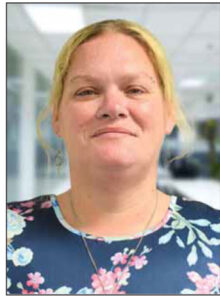
Kacey joined the SVL family in April 2025 and is one of our post-judgment legal assistants. She is originally from Cairo, Georgia, and is currently obtaining her AA degree in legal studies, hoping to get accepted into the FSU law program.
While Kacey is not working, she loves reading and watching movies. Her favorite genre is anything horror, and she enjoys going on haunted tours of cemeteries and abandoned asylums. Kacey is also a huge fan of road trips and making pit stops at all of the silly tourist attractions. She loves the thrill of driving without having any sense of direction or plan for the trip.
Kacey is a mother of two: her daughter, Evelyn, lives in New York City and is a social worker and her son, Ryan, lives in Tallahassee and is currently enrolled at Tallahassee State College, working to obtain his finance degree. Kacey is also a mom to her blue Russian cat, Mouse!
Kacey loves working at Sorenson Van Leuven and says that it feels like you are working with family, because the environment is very friendly and positive. We love having you here, Kacey. Thank you for all you do.
Staff Spotlight on Sarah Strickland
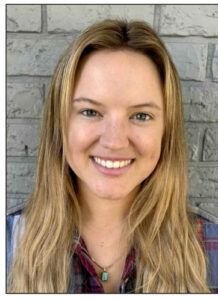
Sarah is from Blountstown, but grew up in Tallahassee, Florida. She joined the SVL team in December 2024 and has been a great asset to our firm. She is one of our legal assistants in the foreclosure department, handling both Florida and Georgia foreclosures, as well as answers to garnishment matters for many of our Credit Union clients. Sarah loves what she does at the firm and says this is the best company she has ever worked for!
In her spare time, Sarah enjoys spending time outdoors; hanging out with her dog, Gracie Lou; going to the beach; and thrifting! She loves a good thrift store or estate sale to go on the hunt for new trinkets and treasures. Sarah has a beautiful collection of estate jewelry, including her favorite, a gold charm bracelet made up of charms from her grandma and her mom. Her newest find is a yellow gold and diamond cocktail ring that she received from a melt bin – she loves it because it is so shiny!
Another fun fact about Sarah is that she is a collector of Disney pins. She has been collecting for two years and goes to the big pin trading events at Walt Disney World with her friends to trade with others from all over the country. Did you know that this pin trading originally started in 1999? Sarah’s favorite pins to collect are the original Disney princesses and the Disney villains! She has quite the collection!
Sarah, we are grateful to have you apart of the SVL team!
Sorenson Van Leuven Team Plays
in Tallahassee Chapter of Credit Union’s
Golf Tournament
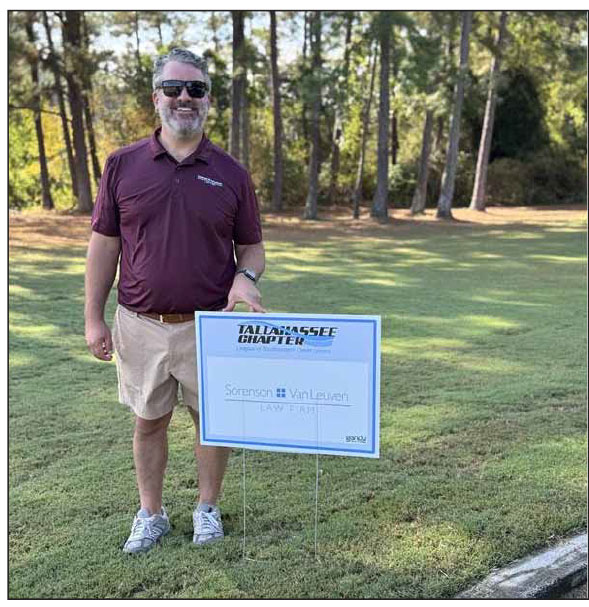 Sorenson Van Leuven was pleased to participate as a Gold Sponsor at the Tallahassee Chapter of Credit Union’s Golf Tournament on September 22, 2025. The event was held at Golden Eagle Country Club, in Tallahassee, Florida. Steve Orsillo represented the firm and had a great time playing in the tournament.
Sorenson Van Leuven was pleased to participate as a Gold Sponsor at the Tallahassee Chapter of Credit Union’s Golf Tournament on September 22, 2025. The event was held at Golden Eagle Country Club, in Tallahassee, Florida. Steve Orsillo represented the firm and had a great time playing in the tournament.
SVL SourcExpo 2025
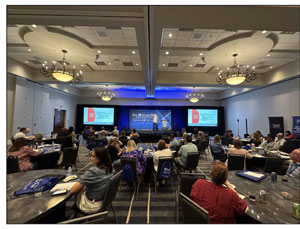 Sorenson Van Leuven was pleased to participate as a Gold Sponsor at the Tallahassee Chapter of Credit Union’s Golf Tournament on September 22, 2025. The event was held at Golden Eagle Country Club, in Tallahassee, Florida. Steve Orsillo represented the firm and had a great time playing in the tournament.
Sorenson Van Leuven was pleased to participate as a Gold Sponsor at the Tallahassee Chapter of Credit Union’s Golf Tournament on September 22, 2025. The event was held at Golden Eagle Country Club, in Tallahassee, Florida. Steve Orsillo represented the firm and had a great time playing in the tournament.
The SourcExpo is our annual learning event for Credit Unions that focuses on collections, bankruptcy, foreclosure, and other related issues. The goal of the SVL SourcExpo is to instruct, innovate, and inspire. We do this by having the attorneys from our office provide training over the three-day event. Additionally, we help Credit Union representatives network with other Credit Unions in attendance to share ideas, while also working to inspire each Credit Union team to improve its processes.
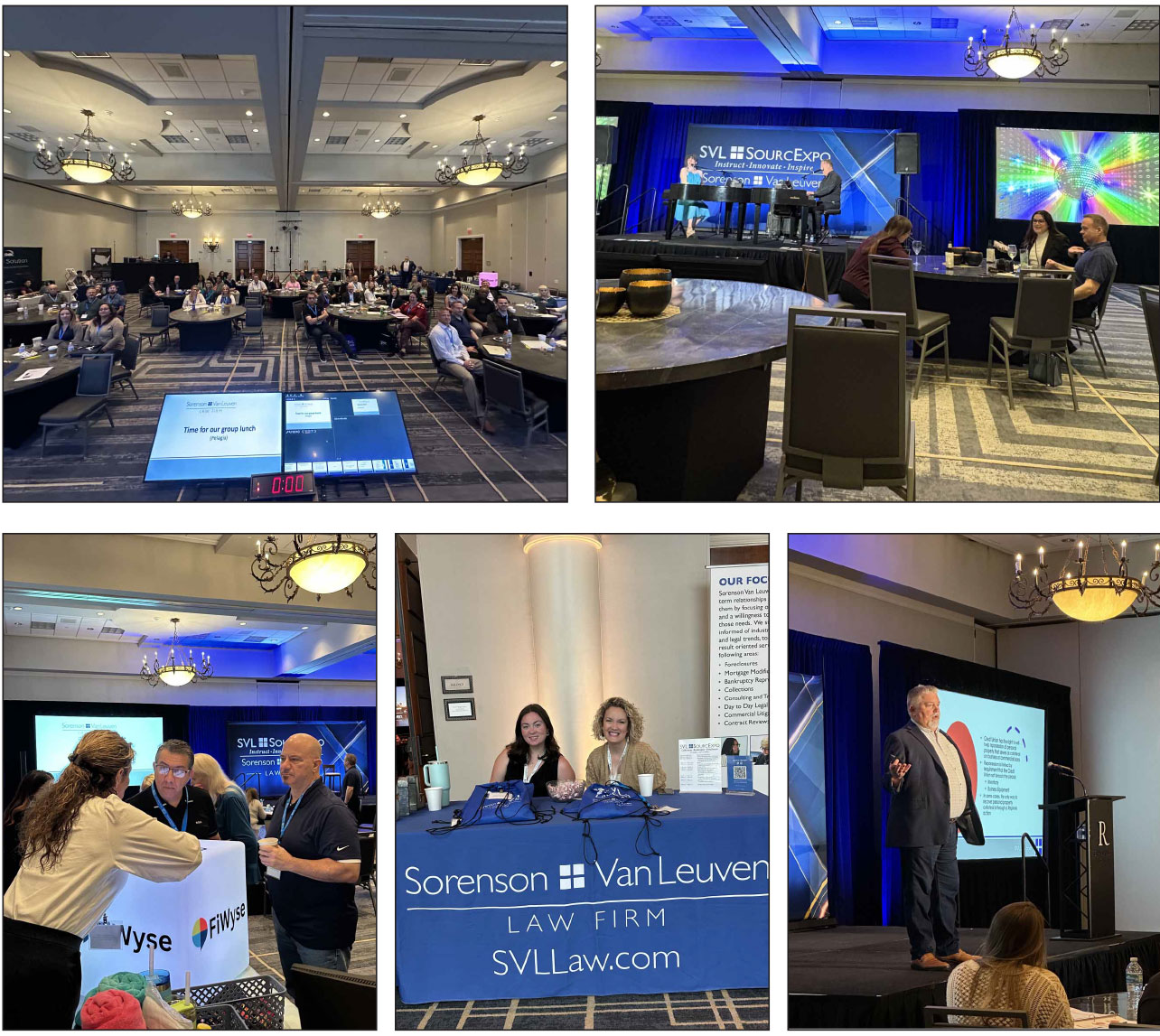
We incorporated something new this year and hosted our event night at the hotel rather than at a local restaurant. We had incredible entertainment from a dueling piano band with a taco bar, drinks, and dessert. It was a fun night with our attendees!
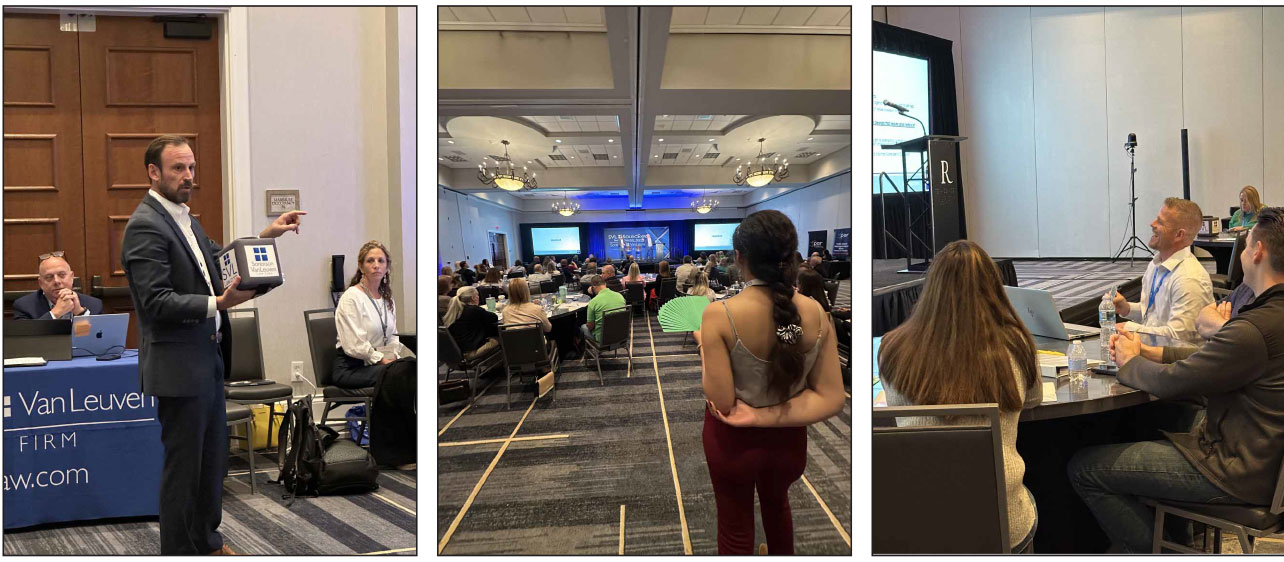
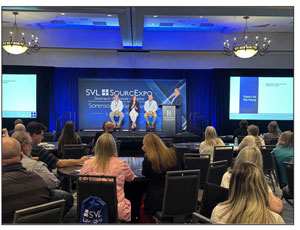 Ready to join us next year? We are excited to announce we will be hosting again in Tampa at the Renaissance International Plaza Hotal for our SVL SourcExpo 2026. The dates for next year’s conference will be July 15th-17th, 2026. Be sure to save the date and join us!
Ready to join us next year? We are excited to announce we will be hosting again in Tampa at the Renaissance International Plaza Hotal for our SVL SourcExpo 2026. The dates for next year’s conference will be July 15th-17th, 2026. Be sure to save the date and join us!
More details will be posted in the coming months. We cannot wait to see you in July 2026!

Proposed Change to Florida
Can a Member’s Bankruptcy Wipe Out
a Debt Without Notice?

One of the most frustrating experiences for a Credit Union is discovering that a member filed for bankruptcy but no notice was received until after the discharge. Understandably, Credit Unions want to know: If we didn’t receive notice of the bankruptcy in time, is the debt still discharged? Unfortunately, the answer is: It depends. A recent bankruptcy court opinion addresses this issue (See In re McIntosh, 30 Fla. L. Weekly Fed. B93a (S.D. Fla. 2025).
The Basics of Discharge in Bankruptcy
In most consumer bankruptcy cases, eligible debts are discharged upon completion of the case. A discharge releases the debtor from personal liability for most debts and prohibits creditors from taking collection action.
Creditors are typically notified shortly after a bankruptcy is filed. The U.S. Bankruptcy Court sends notice by mail to the creditor’s listed address, usually from the debtor’s petition. But what happens if your Credit Union never receives that notice? Or if the debtor omits your claim entirely?
The Key Question: Was the Debt “Listed or Scheduled?”
Under 11 U.S.C. § 523(a)(3), a debt that is not “listed or scheduled” in the bankruptcy case may not be discharged if the creditor was deprived of notice and therefore had no opportunity to file a timely proof of claim or object to the discharge.
However, the type of bankruptcy and the nature of the debt significantly affect the outcome.
In “No-Asset” Chapter 7 Cases: Courts Often Still Discharge the Debt
 In a Chapter 7 “no-asset” case, where the bankruptcy trustee determines there are no assets to distribute to creditors, courts generally hold that all dischargeable debts are wiped out—even if the creditor didn’t receive notice. This is based on the idea that filing a proof of claim wouldn’t have changed the outcome, so the lack of notice caused no practical harm.
In a Chapter 7 “no-asset” case, where the bankruptcy trustee determines there are no assets to distribute to creditors, courts generally hold that all dischargeable debts are wiped out—even if the creditor didn’t receive notice. This is based on the idea that filing a proof of claim wouldn’t have changed the outcome, so the lack of notice caused no practical harm.
This was the situation in the recent McIntosh case mentioned above. The Debtor filed for bankruptcy on July 8, 2002. The Chapter 7 case was a “no-asset” case, and she received her discharge on October 22, 2022. In March 2003, the creditor filed suit against Ms. McIntosh. A judgment was entered against Ms. McIntosh on November 19, 2003.
Almost twenty years later, on March 23, 2023, the creditor filed a garnishment action against Ms. McIntosh. The court found that the creditor was aware of the prior bankruptcy but believed the debt was not discharged because the creditor had not been listed or scheduled. Ultimately, the bankruptcy court found the creditor had violated the discharge injunction and was in contempt of court. The court awarded Ms. McIntosh $33,124.62 in legal fees and costs, plus $10,000.00 in compensatory sanctions. In all, the actions of the creditor in attempting to collect a debt of $7,382.90 ultimately cost that creditor $43,124.62.
In Asset Cases or Chapter 13: Timing May Matter
If the bankruptcy case involved assets (so creditors could have shared in a distribution) or if it was a Chapter 13 case (where creditors may be entitled to payments under a plan), the analysis changes. In these situations, failure to receive notice may preserve your right to collect the debt.
A creditor who never had the chance to participate in the case—by filing a claim or objecting to a Chapter 13 plan—may argue that the debt is not discharged due to lack of due process.
Special Rules for Certain Types of Debt
Even if a debt is listed in the case and the creditor receives notice, it may still be non-dischargeable if it falls into a special category, such as debts incurred by fraud, embezzlement, or willful and malicious conduct. These types of debts require the creditor to file an adversary proceeding in the bankruptcy court by a specific deadline.
Suppose your Credit Union never received notice of the bankruptcy. In that case, courts may allow you to bring a late nondischargeability action—but only if you can show you were deprived of notice and acted promptly once aware.
What Credit Unions Should Do
- Monitor Returned Mail and Bankruptcy Alerts: Sometimes, debtors list outdated addresses. If you spot clues—like returned mail, skip tracing alerts, or bankruptcy notations on a credit report—investigate immediately.
- Use Pacer: Before legal action, do a PACER (PACER stands for Public Access to Court Electronic Records) to confirm whether they have filed for bankruptcy.
- Act Quickly If You Discover a Late Bankruptcy: Once you find out about a bankruptcy that was discharged without notice, consult your lawyer to determine whether the debt may still be enforceable.
Bottom Line: If your Credit Union was unaware of a member’s bankruptcy until after discharge, you may still have options, especially if the case involved assets or you were deprived of due process. But in many no-asset Chapter 7 cases, courts will still apply the discharge. Knowing the distinctions can make the difference between contempt of court and a preserved claim. For a case-specific analysis or questions, we encourage you to contact a lawyer on our SVL team.
Non-Earnings Garnishments:
A Credit Union’s Role as Garnishee

As trusted financial institutions, you are integral to your members’ financial journeys. But, sometimes, navigating the legal landscape that affects your operations can be a challenge, particularly when you, as a Credit Union, are named as a garnishee in a garnishment process. Garnishments can be complex but understanding how to navigate it, while ensuring legal compliance and protecting your members, is essential. This article covers Florida law.
What is a Non-Earnings/Bank Account Garnishment?
A non-earnings/bank account garnishment occurs when a creditor secures a court order that requires a third-party financial institution, such as a Credit Union, to withhold funds from a debtor/member’s account to pay off a debt to a creditor. As a garnishee, the Credit Union plays a critical role in adhering to legal requirements, while balancing the needs of its members.
What Does It Mean for a Credit Union to Be a Garnishee?
If a creditor successfully obtains a Writ of Garnishment, and the Credit Union is named as garnishee, the Credit Union must freeze the member’s account(s) (or specific funds within the account) for the amount specified in the garnishment order. These funds will be held until the garnishment process is completed or until a resolution is reached. As simple as this may seem, it is important to remember that garnishment involves legal, financial, and ethical responsibilities.
Key Steps and Timing in the Garnishment Process:
Filing and Judgment: A creditor must first obtain a final judgment against a debtor before they can begin garnishment proceedings. The creditor then files a Motion for Writ of Garnishment, and a Writ of Garnishment is issued by the court.
Notice of Garnishment: Once the Writ of Garnishment is filed, state laws requires that the creditor notify the debtor and any third-party garnishee (such as a Credit Union) of the garnishment. The Writ of Garnishment must be served on the Credit Union by sheriff or process server. The Credit Union is required to respond to this order promptly (in Florida within 20 days). Upon receiving the Writ, the Credit Union must review the debtor’s accounts to determine the amount to be garnished.
Compliance with Federal Garnishment Regulations: When a Credit Union is served with a garnishment order, it must navigate a complex set of federal regulations designed to protect both the financial institution and the account holder. Under federal law, Credit Unions are required to determine whether the account contains federally-protected benefits, such as Social Security, VA, retirement income, unemployment compensation, or other federal payments. The Credit Union must complete an account review within two business days of receiving a Writ of Garnishment. This review involves two key steps: (1) determining whether any federal benefit payments were directly deposited into the account during the two-month period immediately preceding the date of the review (the “lookback period”), and (2) ensuring that the account holder retains full and customary access to the “protected amount.” The protected amount is defined as the lesser of: (1) the total sum of federal benefit payments posted to the account during the lookback period, or (2) the account balance at the time the review is conducted. This requirement ensures that federally-protected benefits remain accessible to recipients and are not improperly garnished.
In limited circumstances, federal benefit payments may be subject to garnishment despite general protections. If the plaintiff is the United States or a state child support enforcement agency, and the writ is accompanied by a “Notice of Right to Garnish Federal Benefits,” the Credit Union is permitted to freeze funds that would otherwise be protected. In such cases, the protected amount rules under federal regulation do not apply.
Freezing and Transferring Funds: Upon receiving the Writ and after the account review, the Credit Union must freeze the relevant funds (non-protected amount) in the member’s account, as directed. In Florida, the Credit Union can only freeze up to the double the amount stated in the Writ.
Handling Funds After the Account Review and Answer: For business accounts or garnishments issued by the United States or a state child support enforcement agency, if the Writ includes a “Notice of Right to Garnish Federal Benefits,” the Credit Union is required under Florida law to hold all deposits received from the time of service of the Writ through the time the Answer is filed and sent. Once an Answer is filed, any subsequent monies deposited in the Defendant’s accounts will not be subject to the Writ of Garnishment. As to other Writs (e.g., individual consumer garnishments not involving federal agencies or child support), the Credit Union should not hold or freeze any new deposits made after the account review is completed and the protected amount is determined. Only the funds present during the account review, excluding protected amounts, are subject to the garnishment.
Exemption Process: The debtor may file a Claim of Exemption after being served with the garnishment notice. If the debtor files a claim of exemption, the party initiating the garnishment can move forward until the court rules on that exemption. Florida, like most states, has specific exemptions that a debtor may claim to protect the funds in the account from garnishment, including unemployment benefits and retirement funds.
Final Timing for Resolution: If no exemption is claimed, a Final Judgment of Garnishment is entered in Florida, and the garnishee will be commanded to transfer the funds to the creditor. If a Claim of Exemption is filed, the court will hold a hearing, which could take several weeks depending on the court’s schedule. Upon the payment of the sums directed in the Final Judgment of Garnishment, the Writ of Garnishment shall be satisfied, and the Credit Union as the garnishee will be discharged of all liability to the creditor and debtor for the Writ of Garnishment.
Some Strategies for Credit Unions Handling Garnishment Orders
Navigating the garnishment process can be challenging, but by implementing a few key practices, a Credit Union can handle these orders effectively while supporting members. One important practice is ensuring timely, prompt, and clear communication with the members. It is important to inform the member about the garnishment order and explain the amount that will be withheld. Transparency fosters trust and reduces misunderstandings. Also, it is essential to stay updated on legal requirements and laws: federal and state laws regarding garnishment can change and it is important to ensure compliance with any new laws. This is especially critical when dealing with garnishment limits, exempt income, and the timing of garnishment freezes. In addition, the Credit Union must keep records for two years. The records must be sufficient to demonstrate compliance with the rules. A Credit Union’s ability to handle garnishment orders efficiently, not only keeps it compliant, but strengthens its relationships with its members.
As always, if you have any questions or need further clarification on garnishment procedures, don’t hesitate to reach out to one of the attorneys at SVL for legal advice.
Staff Spotlight on Adriana Barba

Adriana was born in Guadalajara, Mexico, but raised in Tepatitlán deMorelos, Mexico, where she currently resides with her family. She is married to her husband Diego Villalobos, and they have two daughters, Estefanía del Carmen, age 10, and Katerine Leticia, age 6. Adriana loves spending time with her family playing games, taking her daughters to gymnastics, working out, and watching movies with her girls.
Adriana began as a legal clerk at Sorenson Van Leuven in December 2024. She is now a part of our bankruptcy team where she sets up all incoming bankruptcy assignments from our Credit Union clients. She also prepares and files the Notices of Appearances with the Court. She will begin learning more of the bankruptcy process very soon! Adriana feels so lucky to be with the firm and has learned so much since December.
In her spare time, Adriana also enjoys reading novels and scientific journals, as well as going on group bike rides to nearby towns on older roads that are no longer high traffic areas. Adriana, you have been a breath of fresh air, and we are so grateful for you. Thank you for being an incredible asset to our team.
Staff Spotlight on Christina Trombly

Christina is from Boca Raton, Florida, but she has lived in Tallahassee for the majority of her life. She received her bachelor’s degree in psychology with a minor in music at Florida State University. While attending college, she played clarinet as a Marching Chief. Christina began playing clarinet in the sixth grade on her mom’s old marching band clarinet. Her dad also played drums while he was in school, so Christina grew up surrounded by a love of music!
Christina has been a part of our SVL team since November 2024. She is a legal assistant in our bankruptcy department. She loves the community here at Sorenson Van Leuven and how the firm makes a point to show everyone how valued and appreciated they are. Christina had an interest in learning more about the legal field due to having a passion to help others.
In Christina’s spare time away from the office, she enjoys reading, working out at the gym, taking walks, and spending time with her family. One of her favorite spring and summertime activities is going sailing with her dad at Shell Point Beach! This summer will also consist of many memories being made as Christina is traveling to Italy and Spain this summer with her family. She is most excited about visiting Cassino, Italy, where her grandmother is from! She is also excited for the food – her absolute favorite cuisine is Italian!
Christina, thank you so much for all you do at our firm. Your hard work and dedication is so appreciated!
ENGAGE Conference 2025
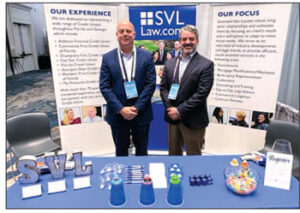 Our firm attended the ENGAGE Conference in Orlando on June 17-June 20 and we had a great time visiting with our Credit Union clients and seeing all of you there. We also had the opportunity to host a booth inside the exhibit hall where we are able to interact and network, as well. This event is always one we look forward to each year.
Our firm attended the ENGAGE Conference in Orlando on June 17-June 20 and we had a great time visiting with our Credit Union clients and seeing all of you there. We also had the opportunity to host a booth inside the exhibit hall where we are able to interact and network, as well. This event is always one we look forward to each year.
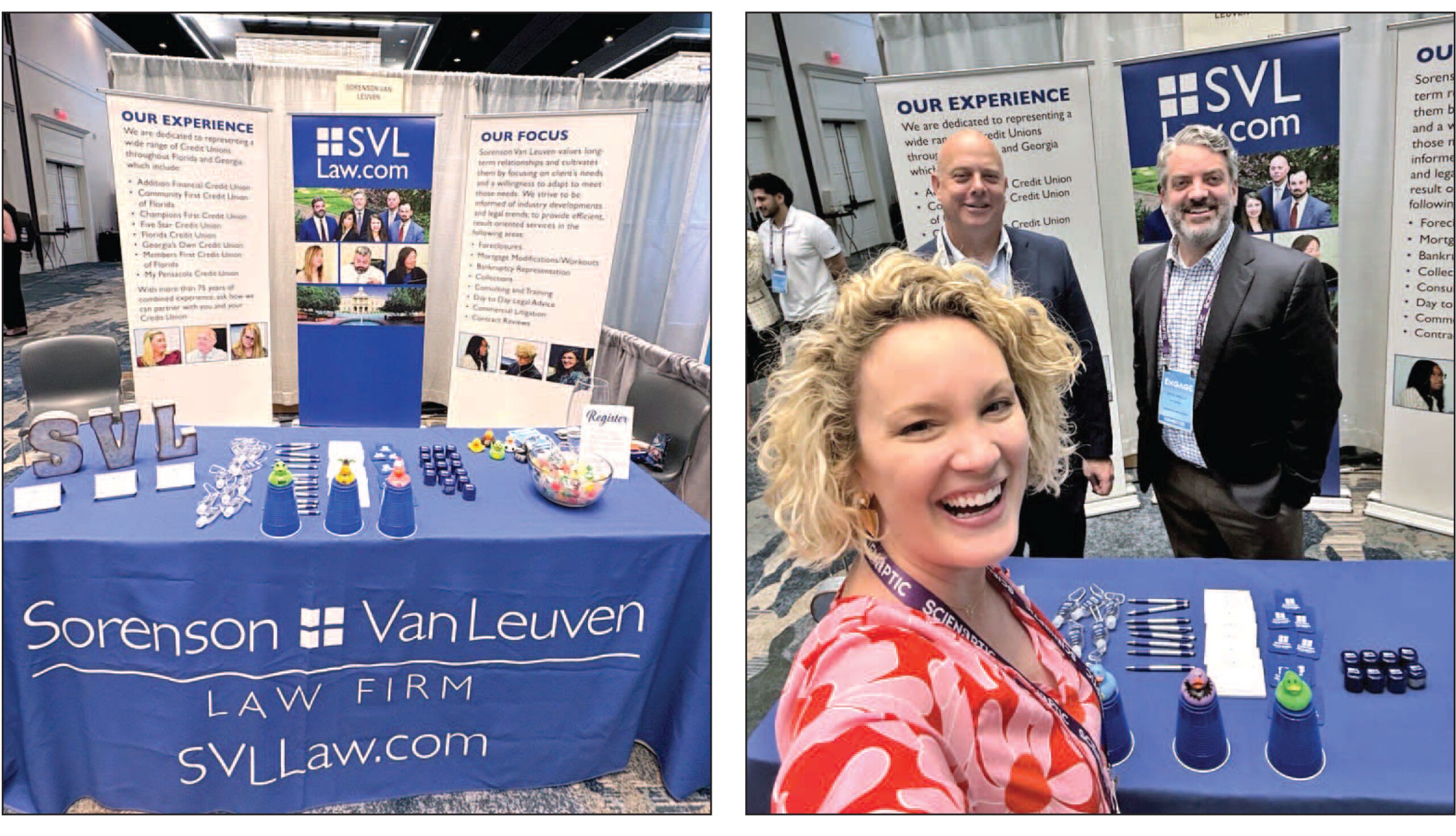

Proposed Change to Florida
Consumer Collections Practices Act

As the annual legislative session in Florida begins, there comes with it a host of new hot button issues and legislative bills. One bill that has been introduced seeks to make a change to the Florida Consumer Collections Practices Act (FCCPA).
One function of a Credit Union is the collection of debts owed to the Credit Union. As part of that function, people have become familiar with the Federal Fair Debt Collections Practices Act (FDCPA), a federal law that places restrictions on debt collectors and debt collection activities. Generally speaking, a Credit Union and its employees do not meet the definition of a debt collector under the FDCPA and are therefore not subject to its rules. However, they do meet the definition of a debt collector under the FCCPA and are thus subject to its provisions and, more importantly, its prohibited practices, found in Section 559.72, Florida Statues. One of those prohibitions deals with when you may contact a debtor, by prohibiting any contact between the hours of 9:00 p.m. to 8:00 a.m. in the time zone of the debtor, unless you have the prior consent of the debtor. The issue of contact in the form of e-mails was recently addressed in Quinn-Davis v. TrueAccord Corp, 23-cv-23590, 2024 WL 4851344 (S.D.F.L. November 20, 2024).
 In Quinn-Davis, the debt collector sent an e-mail to the debtor at 8:23 p.m. It was received in the debtor’s e-mail inbox at 10:14 p.m. but was not opened by the debtor until 11:44 a.m. The debtor sought to bring a class action lawsuit against the debt collector alleging that the e-mail violated the FCCPA in that it was sent between the hours of 9:00 p.m. to 8:00 a.m. in the time zone of the debtor. To prevail under this claim, the debtor must show (1) debtor was the object of a collection activity arising from a consumer debt, (2) the debt collector is a “person” under the FCCPA, and (3) whether the debt collector engaged in an act or omission prohibited by the FCCPA. The Court found “communicate with” is “the conveying of information regarding a debt directly or indirectly to any person through any medium.” In this case, the debt collector only communicated with the debtor when they opened the e-mail from the debt collector and not when the e-mail was sent or received.
In Quinn-Davis, the debt collector sent an e-mail to the debtor at 8:23 p.m. It was received in the debtor’s e-mail inbox at 10:14 p.m. but was not opened by the debtor until 11:44 a.m. The debtor sought to bring a class action lawsuit against the debt collector alleging that the e-mail violated the FCCPA in that it was sent between the hours of 9:00 p.m. to 8:00 a.m. in the time zone of the debtor. To prevail under this claim, the debtor must show (1) debtor was the object of a collection activity arising from a consumer debt, (2) the debt collector is a “person” under the FCCPA, and (3) whether the debt collector engaged in an act or omission prohibited by the FCCPA. The Court found “communicate with” is “the conveying of information regarding a debt directly or indirectly to any person through any medium.” In this case, the debt collector only communicated with the debtor when they opened the e-mail from the debt collector and not when the e-mail was sent or received.
In response to the holding in Quinn-Davis, Senate Bill 232 and House Bill 147 were filed that seeks to make permanent, statewide changes to the current prohibition on any contact between the hours of 9:00 p.m. to 8:00 a.m. in the time zone of the debtor. While the holding in Quinn-Davis is not binding on Florida state courts, it does provide some guidance on how courts may interpret this issue. If passed, the bills will revise Section 559.72(17), Florida Statutes, by specifying that a consumer debt collector may not communicate with a debtor by telephone call between the hours of 9 p.m. and 8 a.m. If passed and signed into law by the Governor, it will take effect July 1, 2025, and will eliminate any litigation and prohibitions on non-telephone communications between 9 p.m. and 8 a.m.
We will continue to monitor this possible change in the law. We will also monitor if it in fact becomes a law.
If you have any questions related to the FCCPA or any aspects of collections, please do not hesitate to contact one of the attorneys at Sorenson Van Leuven for legal advice.
Are You Using this Tool to
Recover Collateral?

We continue to see situations where our clients cannot locate a motor vehicle or boat that is under lien to the Credit Union. Under Florida law, one of the available tools is the ability to place a hold or a stop on a motor vehicle registration or vessel registration. This right exists under Section 320.1316, Florida Statutes. The Department of Highway Safety and Motor Vehicles (DHSMV) has a procedure for demanding the surrender of a motor vehicle or a vessel. This procedure, if followed, will prevent a registered owner of a vehicle or vessel from being able to renew their registration or obtain a replacement license plate.
This procedure is available when the loan secured by the vehicle or vessel is in default (note the loan must be in default, as defined by the terms in the loan documents). For a lienholder to add a stop or hold on a vehicle or vessel registration, two steps must be completed. First, a lienholder must complete a Notice to Surrender Motor Vehicle/Vessel, HSMV Form 82192, and mail it to the registered owner(s). This form alerts the registered owner that the vehicle must be immediately surrendered and allows the lienholder to specify an address and time for the surrender. We suggest that you serve this notice via certified mail, return receipt requested. You should retain a copy of this letter and the return receipt for your records. A copy of this form can be found on the DMV’s website at the following link: https://www.flhsmv.gov/pdf/forms/82192.pdf.
Second, if the registered owner fails to surrender the vehicle, the lienholder must complete HSMV Form 82191. A copy of the form may be found here: https://www.flhsmv.gov/pdf/forms/82191.pdf. When you go to the tag office, be prepared to pay any applicable fees and provide them with a copy of the Form 82192 sent to the registered owner, along with copies of the proof of mailing the form.
A registered owner may dispute the Surrender Notice and Registration Stop by filing a court action, pursuant to Section 320.1316, Florida Statutes. If the registered owner files a legal challenge and loses, the lender is entitled to recover attorney’s fees and court costs. If the registered owner files a legal challenge and wins, the registered owner is entitled to recover attorney’s fees and court costs, as to the lender.
Please do not hesitate to contact our office, should you have any questions regarding this procedure.
Staff Spotlight on Jada Graham

Jada was born and raised in Orange Park, Florida, which is a town outside of Jacksonville. She came to Tallahassee to attend college at Florida State University. She graduated in May 2024 with two bachelor’s degrees – one in Political Science and the other in International Affairs. While attending FSU, she was apart of an organization called “Black Female Future Attorneys,” an organization that provides many networking opportunities to connect with local attorneys in Tallahassee. This group is what solidified Jada’s pursuit of law.
In October 2024, Jada joined our team at SVL. She is one of our legal assistants in the collections department. She said her favorite part about working here is how personable everyone is. Plus, she mentions the little gestures here and there that we offer to show how appreciated the staff is! Jada, we are happy to have you here!
While out of the office, Jada spends time with her friends and family and always loves having something to do. A fun fact about Jada – she is a twin! Her twin brother, Jared, has been her best friend since day one. She is also a big foodie and loves trying new restaurants in the local Tallahassee area. In her downtime at home, she loves binge-watching shows and listening to music. Jada is also a huge football fan, and her favorite team is the Dallas Cowboys (her dad is from Texas, so she had no choice in who her favorite team was going to be), but she does root for her home team, the Jacksonville Jaguars, as long as they aren’t playing the Cowboys!
Jada, thank you for all you do for SVL!
Staff Spotlight on Angela Hoss

Angela was born and raised in Tallahassee. She joined the Sorenson Van Leuven team in August 2024 and has learned various duties while at the firm. Currently, Angela is recording final judgments, filing judgment lien certificates, and learning the post-judgment process to assist our Credit Union clients in their recovery.
Away from the office, Angela enjoys volunteering at a local cat rescue. She spends most of her Saturdays at the rescue helping cats get adopted. She has been volunteering at this facility for the last three years. Angela feels that volunteering with such a good team at the rescue is what pushed her to look for a good work environment. Even though she had no intentions working in the legal field, she loves that she is a good fit at the office, and she enjoys her friendly team of co-workers.
Angela also likes baking and music, specifically singing. Her favorite things to bake are cookies, cake, brownies, and cheesecakes. She loves finding an occasion where she can contribute and make something! Her singing is a hobby that she has always enjoyed. Her favorite movies as a child were musicals, and she took choir throughout most of her school years.
Angela, you have learned so much at the firm in such a short time and we are grateful to have you as a part of our team!
Day of Celebration
 On January 9, 2025, we had our first ever Day of Celebration! At the event, we celebrated the wins and accomplishments of 2024. It was held at the University Center Club at Doak Campbell Stadium. We had a catered firm-wide lunch with games and prizes following. Our remote employees joined us via Zoom, which was a great addition! We look forward to 2025 and what is ahead for SVL.
On January 9, 2025, we had our first ever Day of Celebration! At the event, we celebrated the wins and accomplishments of 2024. It was held at the University Center Club at Doak Campbell Stadium. We had a catered firm-wide lunch with games and prizes following. Our remote employees joined us via Zoom, which was a great addition! We look forward to 2025 and what is ahead for SVL.


New Changes to the Florida
Rules of Civil Procedure Take Effect
on January 1, 2025

The Florida Supreme Court has made numerous changes to the Rules of Civil Procedure for Court cases that will go into effect on January 1, 2025. Most of the changes are designed to streamline civil case administration, better ensure timely judicial decisions, and generally improve efficiency in civil litigation. The amendments will impact a variety of areas, ranging from pretrial procedure, discovery and motion practice, trial, and judicial case management. This article will focus on the rule changes most likely to impact the typical types of Credit Union cases.
Changes to Judicial Case Management
The revisions to Rule 1.200 (Case Management; Pretrial Procedure) effectively overhaul case management procedures. Courts will now assign all civil cases to one of three tracks within 120 days of being filed. The three tracks are “general,” “streamlined,” and “complex” (governed by Rule 1.201). The chief judge of each judicial circuit is required to enter a standing order addressing specific case management requirements. The three tracks will not be based upon the dollar value of the case but rather based upon the amount of judicial attention needed and can take into account the local needs, resources, and automation. I anticipate that the majority of typical Credit Union cases will be designated as “streamlined” because this track is intended for cases with limited discovery needs, well-established legal issues, and an anticipated trial length of no more than three (3) days. That being said, Courts are now required to issue a case management order that specifies the projected trial period and setting deadlines for various stages of the litigation (i.e., service, resolution of motions, and mediation). The new rule will strictly enforce established deadlines and expressly disfavors continuances.
Mandatory Initial Disclosures
Under the amended Rule 1.280(a), parties must now provide initial disclosures within sixty (60) days of filing a complaint, bringing Florida’s rules more in line with the Federal Rules of Civil Procedure. These disclosures must include information such as (1) the names and contact details of individuals likely to have discoverable information; (2) a description of documents and tangible things that may be used to support claims or defenses; (3) a computation of damages; and (4) any insurance agreements that may satisfy all or part of a judgment. Additionally, there is also an ongoing duty to supplement these disclosures as new information emerges. Rule 1.280(f) imposes a duty on parties to promptly supplement or correct their disclosures or discovery responses if they learn that the information provided is incomplete or incorrect.
Changes to Conferral Requirement
 Under Rule 1.202, parties are required to confer before filing non-dispositive motions (typically related to discovery or amending pleadings), promoting collaboration and the resolution of disputes without judicial intervention. Notably, parties are not required to confer on motions for summary judgment, nor those seeking injunctive relief. The duty is imposed upon the moving party to ensure a meet and confer occurs prior to the filing of the motion. The movant is also required to file a Certificate of Conferral with the motion, addressing the date and means of the conference and whether there was an agreement as to the relief sought and the efforts made to obtain such an agreement.
Under Rule 1.202, parties are required to confer before filing non-dispositive motions (typically related to discovery or amending pleadings), promoting collaboration and the resolution of disputes without judicial intervention. Notably, parties are not required to confer on motions for summary judgment, nor those seeking injunctive relief. The duty is imposed upon the moving party to ensure a meet and confer occurs prior to the filing of the motion. The movant is also required to file a Certificate of Conferral with the motion, addressing the date and means of the conference and whether there was an agreement as to the relief sought and the efforts made to obtain such an agreement.
Exemptions to Conferral requirement are as follows: movant or nonmovant is an unrepresented party (pro se); motion to extend time for service of process; default; summary judgment; writ of possession; dismiss for failure to state claim or dismiss for failure to prosecute.
Changes to Summary Judgment
Further reform includes Rule 1.510, which clarifies the timing for filing and responding to motions for summary judgment. Responses must now be filed within sixty (60) days of the motion’s service, rather than the hearing date, ensuring parties have sufficient time to prepare.
Conclusion
The new changes to Florida’s Rules of Civil Procedure should improve the efficiency and transparency of civil litigation by introducing stricter case management practices, improving discovery, and limiting delays by both Judges and lawyers. Please do not hesitate to contact a lawyer at SVL with any questions.
These changes took effect July 1, 2023.
Enforcing Matured Mortgage Loan
 In my twenty-eight years of practicing law, I have found that clients and lawyers are often confused about when a mortgage is no longer enforceable. In Florida, a recent court case highlights the issues and the law when it comes to enforcing a mortgage loan that has matured.
In my twenty-eight years of practicing law, I have found that clients and lawyers are often confused about when a mortgage is no longer enforceable. In Florida, a recent court case highlights the issues and the law when it comes to enforcing a mortgage loan that has matured.
On December 11, 2024, the Third District Court of Appeal issued its opinion in the case of Quintana v. Rodriquez Family Investment Partnership, LLLP. The primary facts surrounding this legal dispute involved a mortgage entered into by Mr. and Ms. Quintana on April 10, 2009, to secure the payment of a promissory note held by the Rodriquez Family Investment Partnership (RFIP). The mortgage specified a maturity date of April 10, 2012. On September 3, 2009, the parties entered into a mortgage modification to secure additional funds owed to RFIP. The mortgage modification did not modify the maturity date. The borrowers continued to pay the mortgage until August 24, 2016.
In 2018, RFIP filed suit against Ms. Quintana, as she was the only living borrower at that time. The suit sought to foreclose the mortgage. In response to the lawsuit, Ms. Quintana raised the defense that the complaint was untimely under Section 95.281, Florida Statutes.
Section 95.281 provides that the lien of a mortgage terminates after the expiration of the following time periods: (1) if the maturity date is notated on the mortgage, then five (5) years after the date of maturity; or (2) if the maturity date is not notated on the mortgage, it is twenty (20) years from the date of the mortgage. The issue in this case is whether the post-maturity payments made by Ms. Quintana extended or tolled the period in Section 95.281. The trial court granted summary judgment in favor of RFIP, and Ms. Quintana appealed that order.
On appeal, the court held that Section 95.281, Florida Statutes, is a statute of repose and not a statute of limitation. A statute of repose differs from a statute of limitation in that it prevents the cause of action from arising after its time limit. On the other hand, a statute of limitation provides a time limit for filing suit after the accrual of a cause of action.
The court found that the only way to extend the time limit in Section 95.281 is for the parties to execute an extension agreement, as provided in subsection 2 of the statute. The fact that the borrower continued to make payments beyond maturity does not extend the time period within which a party must seek to enforce its lien on the mortgaged property.
Why is this case critical? Often, Credit Unions have mortgage loans on their books where the mortgage has matured, but there is still a balance due and owing, and the borrower continues to make monthly payments. Typically, this happens when the borrower has been granted skip-payments, extensions, or had forced placed taxes or insurance added to the loan. The Credit Union’s core system may not recognize the loan has matured, and it continues to treat the loan as ongoing, showing the next monthly due date owed. If the Credit Union is not careful, it could find itself in this situation, with an expired mortgage more than five years past maturity with no rights to foreclose on the property.
Should you have questions about mortgage maturity dates, statute of limitations, or statute of repose on mortgage loans, please do not hesitate to contact a lawyer at SVL.
Staff Spotlight on Ana Barba

Ana was born and raised in Tepatitlán de Morelos, Jalisco, a small town about fifty miles away from Guadalajara. She describes Tepatitlán de Morelos, Jalisco, as a very quiet place with old traditions, making it a very cozy city. Ana studied both Plastic Arts and Humanities in college.
In August of this year, Ana joined our SVL Team. The legal field was not actually in her field of vision for a career; however, she has found that working at the firm has been a very enriching experience. Ana has enjoyed learning many new things and likes that she is challenged every single day. Currently, she is assisting in our collections department but has also prepared demand letters for our Credit Union clients, as well as set up files in our bankruptcy department. Ana, you are an amazing asset to our team.
In her spare time away from the office, Ana loves to ride her bike and spend time with her dog, a ten-year-old Husky named Wilson. He keeps her busy with his nonstop energy! She also enjoys cooking. Her favorite is making cold dishes like ceviche and tuna salad. Ana is also an avid reader of fantasy novels, as well as mystery and horror books. One additional fun fact about Ana is she spent a couple of semesters learning French while in college and is currently retaking lessons on her own to learn even more. Ana, your drive is contagious and we love having you as a part of our team!
Staff Spotlight on Felisha Richardson

Felisa was born and raised in Tallahassee, Florida, and obtained her Associate’s degree from Tallahassee State College, followed by a Bachelor’s degree in Criminology, with a minor in Physiology and Law, from Florida State University. While growing up, Felisa was involved in cheerleading, playing volleyball, and attending church events.
Felisa joined the SVL team in July of this year and is our newest Collections Legal Assistant. She likes that Sorenson Van Leuven has a family dynamic. She says “it sounds cliché, but it’s very comfortable here. When I started, I knew this is where I wanted to be simply by the laughs I heard and by the interactions I watched.” Felisa, we are so glad you are here and love how you describe SVL!
While out of the office, Felisa enjoys spending time with her friends and family, watching movies, and having her “relaxation time.” She also loves to sing, get pampered at the hair/nail salon, and likes to aggravate her parents by making them do TikTok videos with her. That would be fun to watch!
We appreciate you, Felisa, and are grateful for you and your dedication to our firm.
Holiday Party
On Saturday, December 14, 2024, the SVL Team gathered at Jim and Michelle Sorenson’s home to celebrate the holiday season. Staff, spouses, and friends had a great time spreading Christmas cheer with snacks, drinks, and games. We are thankful that we have such a great work family to spend these special times with. Thank you to Jim and Michelle for hosting!


 In commentary surrounding the bill, the Florida Legislature “acknowledges that Florida Statute § 559.72 was adopted before email communication became commonly used, and that the only specific communication explicitly contemplated in such subsection is telephone calls.” Senate Bill 232 sought to “update and clarify prohibited practices in collecting debt to address email communication by excluding such communication from prohibited contact between the hours of 9:00 p.m. and 8:00 a.m. because such contact is less invasive and less disruptive than telephone calls.”
In commentary surrounding the bill, the Florida Legislature “acknowledges that Florida Statute § 559.72 was adopted before email communication became commonly used, and that the only specific communication explicitly contemplated in such subsection is telephone calls.” Senate Bill 232 sought to “update and clarify prohibited practices in collecting debt to address email communication by excluding such communication from prohibited contact between the hours of 9:00 p.m. and 8:00 a.m. because such contact is less invasive and less disruptive than telephone calls.”


 The staff of Sorenson Van Leuven enjoyed Halloween at the office on Friday, October 31, 2025. We had our annual costume contest, which included our Tallahassee and Mexico team. Congrats to our Winners: First Place: Sarah, as a pinata. Second Place: Ale, as a pirate. And Third Place: Noel, as an inflatable cow. We love making SVL a fun working environment.
The staff of Sorenson Van Leuven enjoyed Halloween at the office on Friday, October 31, 2025. We had our annual costume contest, which included our Tallahassee and Mexico team. Congrats to our Winners: First Place: Sarah, as a pinata. Second Place: Ale, as a pirate. And Third Place: Noel, as an inflatable cow. We love making SVL a fun working environment.





 The new system requires that each judicial circuit define three case management tracks: complex, general, and streamlined. The rule empowered the Chief Judge in each judicial circuit to issue administrative orders defining the deadlines for each track. Most collections court cases will fall under the streamlined track. Under the new rule, the streamlined track must address time periods and deadlines for the following: service of the complaints; adding a new party; completing discovery; filing a motion for summary judgment; and completing mediation.
The new system requires that each judicial circuit define three case management tracks: complex, general, and streamlined. The rule empowered the Chief Judge in each judicial circuit to issue administrative orders defining the deadlines for each track. Most collections court cases will fall under the streamlined track. Under the new rule, the streamlined track must address time periods and deadlines for the following: service of the complaints; adding a new party; completing discovery; filing a motion for summary judgment; and completing mediation.


 Sorenson Van Leuven was pleased to participate as a Gold Sponsor at the Tallahassee Chapter of Credit Union’s Golf Tournament on September 22, 2025. The event was held at Golden Eagle Country Club, in Tallahassee, Florida. Steve Orsillo represented the firm and had a great time playing in the tournament.
Sorenson Van Leuven was pleased to participate as a Gold Sponsor at the Tallahassee Chapter of Credit Union’s Golf Tournament on September 22, 2025. The event was held at Golden Eagle Country Club, in Tallahassee, Florida. Steve Orsillo represented the firm and had a great time playing in the tournament. Sorenson Van Leuven was pleased to participate as a Gold Sponsor at the Tallahassee Chapter of Credit Union’s Golf Tournament on September 22, 2025. The event was held at Golden Eagle Country Club, in Tallahassee, Florida. Steve Orsillo represented the firm and had a great time playing in the tournament.
Sorenson Van Leuven was pleased to participate as a Gold Sponsor at the Tallahassee Chapter of Credit Union’s Golf Tournament on September 22, 2025. The event was held at Golden Eagle Country Club, in Tallahassee, Florida. Steve Orsillo represented the firm and had a great time playing in the tournament.

 Ready to join us next year? We are excited to announce we will be hosting again in Tampa at the Renaissance International Plaza Hotal for our SVL SourcExpo 2026. The dates for next year’s conference will be July 15th-17th, 2026. Be sure to save the date and join us!
Ready to join us next year? We are excited to announce we will be hosting again in Tampa at the Renaissance International Plaza Hotal for our SVL SourcExpo 2026. The dates for next year’s conference will be July 15th-17th, 2026. Be sure to save the date and join us!
 In a Chapter 7 “no-asset” case, where the bankruptcy trustee determines there are no assets to distribute to creditors, courts generally hold that all dischargeable debts are wiped out—even if the creditor didn’t receive notice. This is based on the idea that filing a proof of claim wouldn’t have changed the outcome, so the lack of notice caused no practical harm.
In a Chapter 7 “no-asset” case, where the bankruptcy trustee determines there are no assets to distribute to creditors, courts generally hold that all dischargeable debts are wiped out—even if the creditor didn’t receive notice. This is based on the idea that filing a proof of claim wouldn’t have changed the outcome, so the lack of notice caused no practical harm.


 Our firm attended the ENGAGE Conference in Orlando on June 17-June 20 and we had a great time visiting with our Credit Union clients and seeing all of you there. We also had the opportunity to host a booth inside the exhibit hall where we are able to interact and network, as well. This event is always one we look forward to each year.
Our firm attended the ENGAGE Conference in Orlando on June 17-June 20 and we had a great time visiting with our Credit Union clients and seeing all of you there. We also had the opportunity to host a booth inside the exhibit hall where we are able to interact and network, as well. This event is always one we look forward to each year.


 In Quinn-Davis, the debt collector sent an e-mail to the debtor at 8:23 p.m. It was received in the debtor’s e-mail inbox at 10:14 p.m. but was not opened by the debtor until 11:44 a.m. The debtor sought to bring a class action lawsuit against the debt collector alleging that the e-mail violated the FCCPA in that it was sent between the hours of 9:00 p.m. to 8:00 a.m. in the time zone of the debtor. To prevail under this claim, the debtor must show (1) debtor was the object of a collection activity arising from a consumer debt, (2) the debt collector is a “person” under the FCCPA, and (3) whether the debt collector engaged in an act or omission prohibited by the FCCPA. The Court found “communicate with” is “the conveying of information regarding a debt directly or indirectly to any person through any medium.” In this case, the debt collector only communicated with the debtor when they opened the e-mail from the debt collector and not when the e-mail was sent or received.
In Quinn-Davis, the debt collector sent an e-mail to the debtor at 8:23 p.m. It was received in the debtor’s e-mail inbox at 10:14 p.m. but was not opened by the debtor until 11:44 a.m. The debtor sought to bring a class action lawsuit against the debt collector alleging that the e-mail violated the FCCPA in that it was sent between the hours of 9:00 p.m. to 8:00 a.m. in the time zone of the debtor. To prevail under this claim, the debtor must show (1) debtor was the object of a collection activity arising from a consumer debt, (2) the debt collector is a “person” under the FCCPA, and (3) whether the debt collector engaged in an act or omission prohibited by the FCCPA. The Court found “communicate with” is “the conveying of information regarding a debt directly or indirectly to any person through any medium.” In this case, the debt collector only communicated with the debtor when they opened the e-mail from the debt collector and not when the e-mail was sent or received.


 On January 9, 2025, we had our first ever Day of Celebration! At the event, we celebrated the wins and accomplishments of 2024. It was held at the University Center Club at Doak Campbell Stadium. We had a catered firm-wide lunch with games and prizes following. Our remote employees joined us via Zoom, which was a great addition! We look forward to 2025 and what is ahead for SVL.
On January 9, 2025, we had our first ever Day of Celebration! At the event, we celebrated the wins and accomplishments of 2024. It was held at the University Center Club at Doak Campbell Stadium. We had a catered firm-wide lunch with games and prizes following. Our remote employees joined us via Zoom, which was a great addition! We look forward to 2025 and what is ahead for SVL.

 Under Rule 1.202, parties are required to confer before filing non-dispositive motions (typically related to discovery or amending pleadings), promoting collaboration and the resolution of disputes without judicial intervention. Notably, parties are not required to confer on motions for summary judgment, nor those seeking injunctive relief. The duty is imposed upon the moving party to ensure a meet and confer occurs prior to the filing of the motion. The movant is also required to file a Certificate of Conferral with the motion, addressing the date and means of the conference and whether there was an agreement as to the relief sought and the efforts made to obtain such an agreement.
Under Rule 1.202, parties are required to confer before filing non-dispositive motions (typically related to discovery or amending pleadings), promoting collaboration and the resolution of disputes without judicial intervention. Notably, parties are not required to confer on motions for summary judgment, nor those seeking injunctive relief. The duty is imposed upon the moving party to ensure a meet and confer occurs prior to the filing of the motion. The movant is also required to file a Certificate of Conferral with the motion, addressing the date and means of the conference and whether there was an agreement as to the relief sought and the efforts made to obtain such an agreement.

